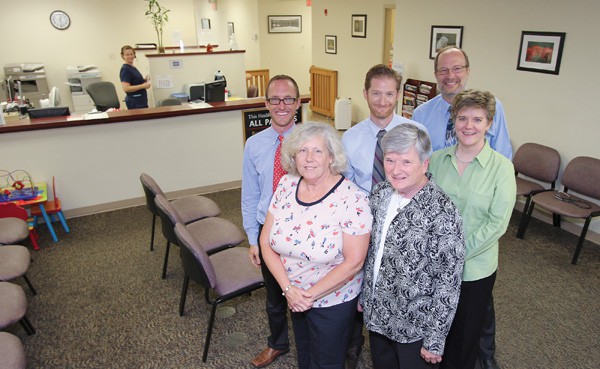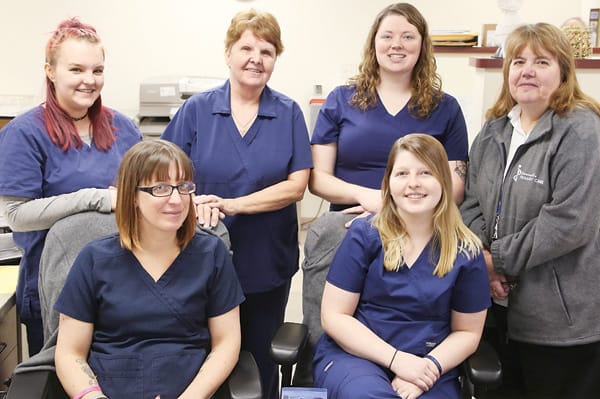Health Care for All
Over $10,000. That’s what the average American spent for health care in 2016, and up is where that number is heading.
“My wife’s health insurance jumped 38.9 percent,” laments a friend recently retired. “My pension is disappearing.”
Across the age spectrum, you hear endless variationa of the same story.
Last year, 11.9 percent of Anne Arundel County residents couldn’t afford to see a doctor, according to the county’s Report Card of Community Health Indicators. Seventeen percent didn’t have a primary care physician.
In a culture where health and wealth are inextricably linked, Owensville Primary Care is a haven. It welcomes all with these words: This Health Center serves all patients regardless of insurance status or ability to pay.
It is an oddly placed haven.
If you wanted to show off southern Anne Arundel County’s pastoral ideal, you couldn’t do better than take a drive down Owensville Road, the east-west link between Rt. 2 and Galesville. Amid imposing white homes set back on yards rolling into farm fields, the modernistic stucco building might, if noticed, raise a question.
Its placement tells a truer story of Southern Maryland life than the scenery. It’s a story in many ways little changed since Owensville Primary Care was founded in 1974 to, in CEO Sylvia Jennings’ words, “address the needs of a very low-income, rural, minority population that did not have access to health care.”
Over four decades, Jennings has seen need persist and — for many of those years — overseen Owensville Primary Care’s ability to deliver care regardless of race, age or income.
“We pledge to provide quality health care to our entire, diverse community at a responsible cost,” Jennings says. “That’s our mission.”
Since the Affordable Care Act was passed, that pledge has included helping people, patients or not, find qualified health care programs. Nowadays, people losing their subsidies are welcome for advice and alternatives.
A Melting Pot
In the utilitarian waiting room, you find yourself in a microcosm of the larger Southern Anne Arundel County community, where homes — and with them wealth — run the full range from mansions to shanties. Here, your neighbors — black and white, young and old, more and less affluent — visit as they wait. You might find — as I did on this day — a kid sucking a lollipop. Two elderly women, black and white. A tattooed hipster with an ear gauge in his lobe. A workingman in an Orioles cap. Yourself.
 Owensville Primary Care outgoing CEO Sylvia Jennings, retiring after more than 20 years. |
Owensville Primary Care has become, over the years, an American melting pot.
“I came in one morning to find a Jaguar in the parking lot next to a jalopy,” says Jennings, the white-topped dynamo who for two decades has been CEO of this federally qualified Community Health Center, one of 16 in Maryland and some 1,400 nationwide.
The numbers support the impression of diversity. Of October’s 1,156 patient visits, 38 percent were paid by commercial insurance, 32 percent by Medicare and 28 percent by Medicaid, with two percent self-paid.
Walking Into a Nightmare
Jennings, 82 and days from retirement, works behind the scenes, in an office stocked with tall jars of Hershey’s Kisses. Jolly, direct and demanding, she does not want a visit to her sanctum to feel like “a walk down the hall to the principal.”
For the office she is now dismantling has been the scene of many hard decisions.
“I walked into a nightmare,” Jennings recalls.
In 1981, the well-intentioned, six-year-old South County Family Health had descended into bankruptcy. With $1.5 million owed, court administrators threatened to “nail doors shut and walk away,” Jennings remembers. That’s when she joined the board, deputized by her boss, Virginia Clagett, then South County’s councilwoman.
Paying off that debt took eight years.
A second round of troubles in the mid 1990s brought Jennings back on the board to captain “a sinking ship.” First she laughed at entreaties; finally she accepted. That was 1997. She spent the next two years cleaning up the mess.
The Team
Jennings has been the force that kept Owensville Primary Care on track.
But hers is not the face you’re likely to know if you happen to be one of its 3,400 patients, from birth to geriatrics.
First you meet the reception crew, who, Jennings says and experience proves, are “welcoming and treat you not as a stranger but as a friend.”
 photo by Wayne BierbaumBack, doctors Thomas Sheesley, Jonathan Hennessee and Wayne Bierbaum. Front, nurse practitioner Nancy Bryan, behavioral health director Dr. Jana Raup and physicians assistant Ann Hendon. 
photo by Wayne BierbaumRebecca Woolwine, Judy Bracken, Amber Snay and Billie Aisquith in back row. Keri Mahan and Brittany Galloway, seated. |
Many, like office manager Billie Aisquith, have been here as long as Jennings. Increasingly, they are “cross-trained in multiple functions,” like Vickie Payne, who is also a fire department EMT just certified as a medical assistant through Anne Arundel Community College’s online program.
“When they expand their skills, they expand their incomes,” Jennings says.
Next, you enter into the hands of nurses — among them nurse supervisor Vanessa Greenwell, Owensville Primary’s longest serving staffer at over 30 years — who’ll take your weight and height, blood pressure, temperature and blood oxygen readings.
They turn you over to health care providers, who range from doctors to nurse practitioner Nancy Bryan, retired from the U.S. Navy Nurse Corps, to physician assistant Ann Hendon.
At 28 years in, chief medical officer Wayne Bierbaum calls his egalitarian work at Owensville Primary “what I’ve wanted to do since I decided to go into medicine: helping people manage in difficult circumstances.”
Doctors Jonathan Hennessee and Thomas Sheesley are National Health Service Corps Scholars, who repay their medical education by working in communities with limited access to care, in their cases for a term of five years.
Behavioral Health Director Jana Raup or Licensed Clinical Social Worker Jen Thornton offer counseling and therapy.
Right People for the Job
From the bottom up and top down, salaries are a priority with Jennings, who brings her medical experience as a nurse along with administrative experience alongside a state legislator.
“I really focused on getting people a decent wage,” she said. “Even then, $7 an hour for nurses was ridiculous.”
“The money wasn’t there so it was a long process,” says Sharon Widemann, Jennings’ long-time colleague and now successor as CEO.
Nowadays, Jennings calls “our salaries very competitive,” good enough to draw expertise from outside South County.
“Young physicians fresh out of school are paid a very good entry-level wage that appreciates the fact that family-care physicians are difficult to recruit,” she notes.
For five years, Jennings and Widemann, who came on in 1994 as an accountant, “got our hands dirty with work to make sure we had the right hiring.”
Computerization brought the next challenge.
“When IT hit us all with electronic records, we were able to draw the best staff among community health centers, who are doing wonders for our record keeping,” Widemann says.
Finding Wherewithal
Every step took money.
Community health centers are backed by tax dollars. Owensville Primary Care has a $4 million budget, with federal funding of about $1.5 million, supplemented by fees for service, donations from citizens and small government grants for targeted programs.
Federal and private funding supported the construction of the building back in 1976, enabling Owensville Primary to move out of the old Owensville primary school. The building was county property until 2002, when it was surplussed to Owensville Primary. That same year, a state grant of $200,000 and a loan from the county paid for renovation. Later grants paid for better parking. This year, the behavioral health center moved into its own remodeled space, replacing the old post office that shared space with Owensville Primary.
Grants enabled growth in services. In 2013 federal monies brought on behavioral health case managers, certified application counselors for Affordable Care and expanded Medicare, plus two more physicians.
A brand-new grant supports response to the opioid addiction crisis with mental health, public awareness and Narcan training.
From Jennings’ years with Clagett as both councilwoman and delegate, she understood the levers of government.
“She has kept us in the minds of politicians who help our cause,” says chief medical officer Wayne Bierbaum.
Jennings retires with Owensville Primary Care “in the black.” But not without a touch of uncertainty. Federal funding for community health centers expired September 30, and Congress has yet to reauthorize it.
Recovery from a troubled past has made accountability part of each day’s work.
“We hold ourselves accountable with committees for quality care, insurance and improvement,” Widemann says. “Once a month, a group of clinical and administrative staff review incidents and look at how our patients are doing. If one provider is doing a great job, we see how to share those best practices.”
Patients have two ways to rate their satisfactions, and a sign on the reception desk invites complaints if you’ve waited more than 20 minutes to be seen. Quality measures are posted on the front door and the website.
Accountability is one of the hallmarks of Jennings’ tenure, according to Bierbaum who has worked beside her the whole time.
“Our goals have been continually strengthened through her vision of what we should become, so that everyone knows that we stand for service delivered with compassion, accountability and professionalism, always trying to do better in our mission,” he says.
On January 2, Jennings passed on title and responsibility to Widemann. She leaves with satisfaction, relief and confidence, in a transition that, she promises, “will be seamless.” Preparing Widemann to continue the mission has been Jennings’ final achievement.
That, and revisiting 22 years of history, paper, electronic and human.
Amid the sorting, preserving and trashing, there was reflecting.
Jennings already had reached retirement age when she was persuaded to come to the rescue of Owensville Primary Care.
“I thought I’d do it a couple years and get it straightened out,” she recalls.
But day after day, year after year, she returned.
“What I do every day of my life is so satisfying that it has allowed me to work till 82,” she says.
 Outgoing CEO Sylvia Jennings, left, and her successor, Sharon Widemann. |
Now, 20 years in, she allows herself to be “very personally pleased with myself for the job I have done here. Some people will call me smug, but you have to have some personal reward. I’m not talking about money but about feeling I have contributed something to my neighbors and friends.”
Widemann’s mission is continuing a success she helped create.
“We have a very fully equipped and functioning federal community health center, a strong executive staff, strong providers and a growing behavioral health component,” the new CEO says.
Her plan is to reach into the community to bring affordable health care to people still unserved. Growing the behavioral health unit is a particular goal.
She steps comfortably into Jennings’ big shoes.
“We’re not a one-woman show anymore,” Widemann says. “We’re a team effort. Plus, I know where Sylvia lives.”
